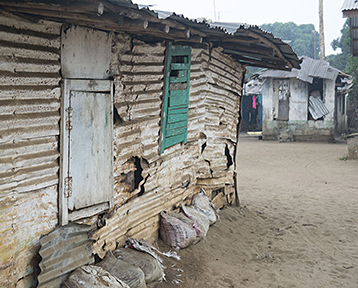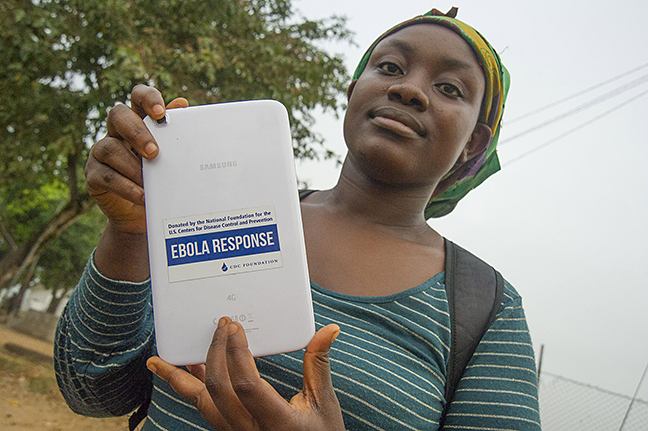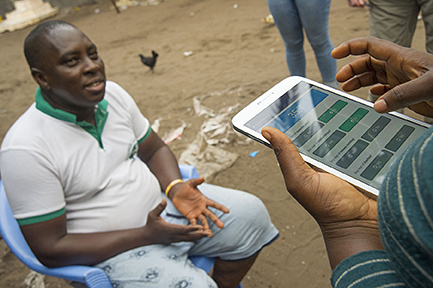You are here
Contact Tracers Essential in Fight to Stop Ebola
This is the fourth blog post from a CDC Foundation trip to West Africa. On this trip, Charlie Stokes, president and CEO of the CDC Foundation, and two team members were looking at the Ebola response work funded through the CDC Foundation by private sector donors.
Contact tracing—finding anyone who may have had contact with a person suspected of having a disease—is essential in stopping the spread of Ebola. But make no mistake, it is difficult work, both physically and emotionally. However, there are moments of reward that come with the challenges.
 Early this past Sunday morning a small group of CDC Foundation staff, along with representatives of eHealth Africa and the Paul G. Allen Family Foundation, had the opportunity to see firsthand the challenges and successes that come with tracking down contacts of Ebola patients in Liberia.
Early this past Sunday morning a small group of CDC Foundation staff, along with representatives of eHealth Africa and the Paul G. Allen Family Foundation, had the opportunity to see firsthand the challenges and successes that come with tracking down contacts of Ebola patients in Liberia.
The group was led by Dorissa Bestman, a contact tracer in the New Kru Town neighborhood in Monrovia, the nation’s capital city. Dorissa knows the neighborhood well, having grown up there. Her job is to monitor the daily temperatures and potential symptoms of those who have come in close contact with Ebola-infected patients.
Dorissa started working as a contact tracer in August, and she tells us that at first she encountered a great deal of resistance. Recently, though, things have begun to change as trust has been built with the community. In her rounds, Dorissa, who is a nursing student, typically walks many miles through thick sand and over uneven roads in the heat as she follows up with contacts.
We head out early to catch people before they go to church later in the morning. At the first house Dorissa visits, she approaches an elderly woman who slowly gets up and walks over. The woman came in contact with Ebola a few weeks back while caring for her sick brother, who later died from the disease. Dorissa takes the woman’s temperature, and it is normal. She shows no signs of the disease and has a week to go before reaching the 21-day monitoring period in which Ebola symptoms would arise. At that time, the woman hopes to receive the welcome news that she does not have the disease.
 From there, the group begins the walk to the next person. On the way, Dorissa points to a small house and says, “There were 30 people living there—29 died from Ebola.” The house is now occupied, but the faint early morning light gives it an eerie appearance. Looking in, it’s difficult to imagine the trauma of the lone survivor, who we are told is receiving psychosocial counseling.
From there, the group begins the walk to the next person. On the way, Dorissa points to a small house and says, “There were 30 people living there—29 died from Ebola.” The house is now occupied, but the faint early morning light gives it an eerie appearance. Looking in, it’s difficult to imagine the trauma of the lone survivor, who we are told is receiving psychosocial counseling.
Dorissa is taking part in an Ebola case monitoring trial program in Liberia using tablet computers. Funding for both the tablets and the training for the effort were made possible through CDC Foundation donors. The tablets are loaded with software used to track patients and keep their records. The trial is being conducted by eHealth Africa, the CDC Foundation’s on-the-ground partner in West Africa. The CDC Foundation and the U.S. Centers for Disease Control and Prevention (CDC) are working with eHealth Africa on the effort.
Neiger Green, a data management coordinator with eHealth, is managing the trial. She was born in New Kru Town, but has lived in the United States for many years. This fall Neiger felt the draw to return to Liberia to participate in the Ebola response effort. If the trial Neiger is managing is successful, it will reduce the need for subsequent data input, thus saving valuable time and reducing the risk of data entry errors.
 When we arrive at the next home, we are greeted by Pastor Joseph Gillay. He became in contact after caring for his uncle, who died three weeks ago. Today is Pastor Gillay’s last day to be monitored, if he shows no Ebola symptoms. Dorissa checks his temperature—it is normal—and Pastor Gillay is symptom-free.
When we arrive at the next home, we are greeted by Pastor Joseph Gillay. He became in contact after caring for his uncle, who died three weeks ago. Today is Pastor Gillay’s last day to be monitored, if he shows no Ebola symptoms. Dorissa checks his temperature—it is normal—and Pastor Gillay is symptom-free.
“Today, I praise God,” says the pastor, who tells us that he will be preaching later in the morning. At this point, we leave Dorissa, who has several more houses to visit.
While Ebola cases have dramatically declined in Liberia since early this fall, responders in both government and non-government organizations know that they must remain vigilant to get and then keep the case count at zero. Contact tracers working on the frontlines of the outbreak are doing their part to work toward that goal, and the CDC Foundation, its donors and partners are proud to support them.
Photos: ©David Snyder/CDC Foundation
